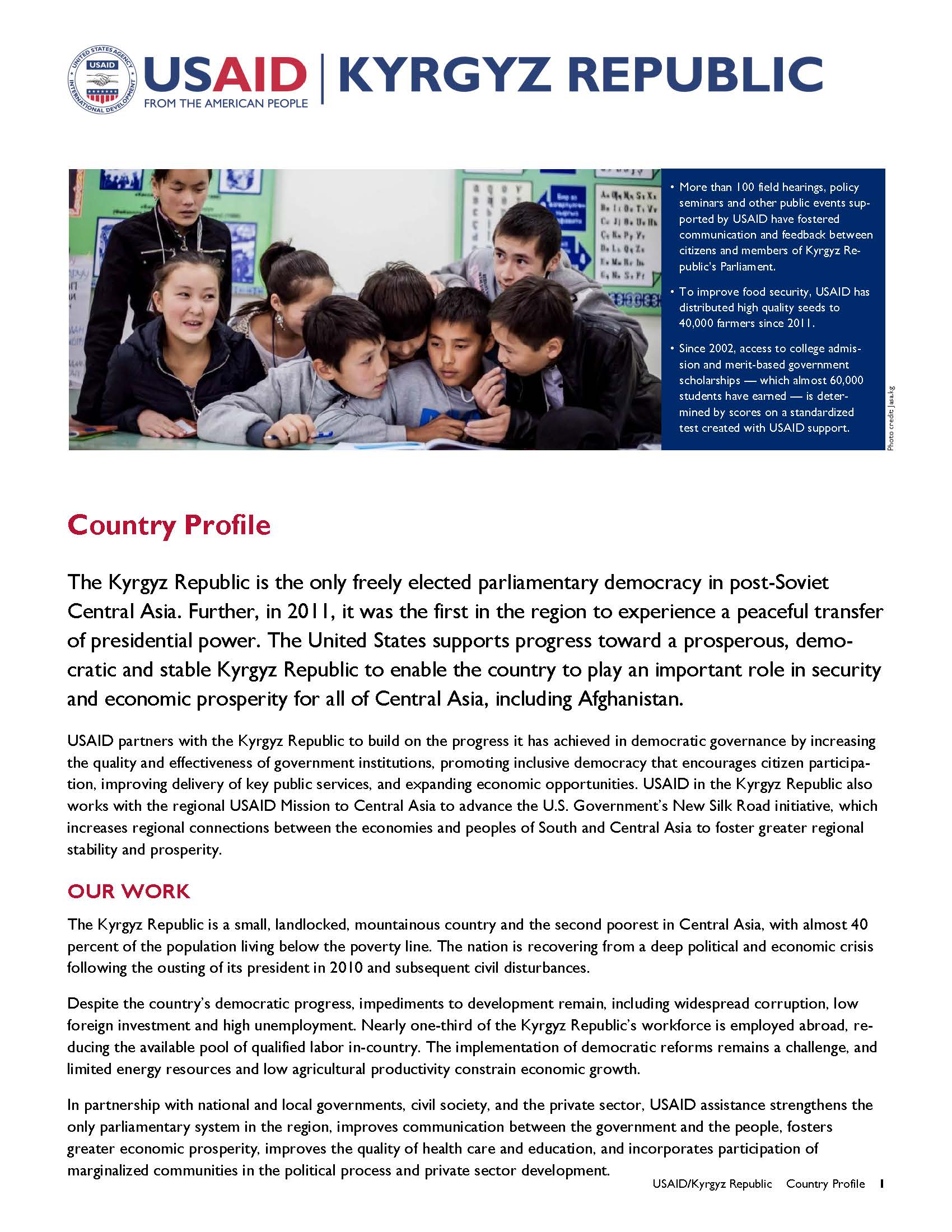Speeches Shim
The Kyrgyz Republic is the only freely elected parliamentary democracy in post-Soviet Central Asia. Further, in 2011, it was the first in the region to experience a peaceful transfer of presidential power. The United States supports progress toward a prosperous, democratic and stable Kyrgyz Republic to enable the country to play an important role in security and economic prosperity for all of Central Asia, including Afghanistan.
USAID partners with the Kyrgyz Republic to build on the progress it has achieved in democratic governance by increasing the quality and effectiveness of government institutions, promoting inclusive democracy that encourages citizen participa-tion, improving delivery of key public services, and expanding economic opportunities. USAID in the Kyrgyz Republic also works with the regional USAID Mission to Central Asia to advance the U.S. Government’s New Silk Road initiative, which increases regional connections between the economies and peoples of South and Central Asia to foster greater regional stability and prosperity.
OUR WORK
The Kyrgyz Republic is a small, landlocked, mountainous country and the second poorest in Central Asia, with almost 40 percent of the population living below the poverty line. The nation is recovering from a deep political and economic crisis following the ousting of its president in 2010 and subsequent civil disturbances.
Despite the country’s democratic progress, impediments to development remain, including widespread corruption, low foreign investment and high unemployment. Nearly one-third of the Kyrgyz Republic’s workforce is employed abroad, reducing the available pool of qualified labor in-country. The implementation of democratic reforms remains a challenge, and limited energy resources and low agricultural productivity constrain economic growth.
In partnership with national and local governments, civil society, and the private sector, USAID assistance strengthens the only parliamentary system in the region, improves communication between the government and the people, fosters greater economic prosperity, improves the quality of health care and education, and incorporates participation of marginalized communities in the political process and private sector development.
DEMOCRACY, HUMAN RIGHTS AND GOVERNANCE
USAID supports the consolidation and development of the country’s parliamentary democracy through technical assistance to improve the effectiveness and responsiveness of a range of government institutions, including the Parliament itself and key ministries. USAID helps instill the rule of law and respect for human rights through support to the judiciary, defense lawyers and activists monitoring and advocating for human rights. USAID assists civil society in serving as a more effective partner with government and the private sector — particularly as a source of advocacy, public policy input and basic public service delivery. Recognizing that 50 percent of the population is under the age of 25, USAID invests in future generations through life skills training and civic education.
ECONOMIC GROWTH AND TRADE
USAID supports governmental and private sector initiatives in establishing an enabling environment conducive to busi-ness, advancing workforce development in key sectors of the Kyrgyz economy, and strengthening the country’s food production. USAID also encourages economic policy reforms that promote trade, improve the business operating environment, attract investment and create jobs. While USAID primarily focuses development assistance at the national level, a significant emphasis is also placed on the southern regions of the country, which are home to the highest rates of poverty, malnutrition and food insecurity. In addition, USAID advises the Government of the Kyrgyz Republic on improved management of the country’s electrical power.
SOCIAL SECTOR SUPPORT
USAID works closely with the Kyrgyz Republic’s Ministry of Education, local counterparts and other donors to expand and improve access to quality basic and higher education. USAID supports the Kyrgyz Republic’s 2012 – 2020 Education Development Strategy by working with 7,500 teachers — who collectively reach 60 percent of the Kyrgyz Republic’s primary grade student population — to improve student reading levels in the country.
USAID partners with the Ministry of Health to improve access to care and treatment for HIV/AIDS and tuberculosis and to prevent the spread of these infectious diseases. These efforts include providing support and outreach to high-risk populations, improving the quality of HIV/AIDS care, and working closely with the civil society groups that serve people at risk for and living with HIV/AIDS. Tuberculosis activities include training for laboratories and health care providers, assistance in improving infection prevention, support for new diagnostic technologies, and improving the clinical regulations that guide care.


Comment
Make a general inquiry or suggest an improvement.